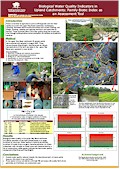| Poster |
 |
|
| Title | Biological Water Quality Indicators in Upland Catchments: Family Biotic Index as an Assessment Tool | | Author | Subekti Rahayu, Indra Suryadi, Bruno Verbist, Meine van Noordwijk and Rudy Harto Widodo | | Year | 2008 | | Publisher | World Agroforestry Centre - ICRAF, SEA Regional Office | | City | Bogor, Indonesia | | Call Number | PO0143-08 |
|
| Abstract: |
| Forest conversion to agriculture such as coffee garden and rice field occurred in Way Besai watershed, Sumberjaya, Lampung Province, Indonesia. During forest conversion, activities such as land clearing, soil tillage, planting, weeding, fertilizing and pesticide applied by farmers. Those activities effected to the water quality along the stream and river through sedimentation, nutrient accumulation and pesticide residue. Water quality is determined by assessing three classes of attributes: physical, chemical and biological. Both of chemichal and physical attributes need higher cost on laboratory analysis that biological assessment using macroinvertebrates. Evaluating of biological community of a stream through assessment macroinvertebrates provides a sensitive and cost effective means on determining stream condition.
The objectives of this reaseach are: to assess water quality condition based on Family Biotic Index 30 plots along Way Besai river with three nested streams (Way Petai, Way Ringkih and Air Hitam) choosed as a samples. Aquatic macroinvertebrate collected from these stream in August 2005 and identified up to family level.
Biological water quality in the upper Way Besai catchment is in range excellent to very poor. Water quality in forest area indicate excellent it’s mean that no organic material pollution. Air Hitam watershed, with virtually no forest cover and characterized by a lot of monoculture coffee garden indicate the best water quality compared to Way Petai and Way Ringkih. Overall water quality reduces towards the downstream part. At some points however this trend is not confirmed. There seems to be a correlation with high FBI and areas with paddy field where pesticides and fertilizers are extensively used. |
|
|
Download file(s): Click icon to download/open file.
|
| |
File Size |
Description |

|
698 Kb |
Softcopy |
|
|
GRP 4: Reducing risks to land health and targeting agroforestry interventions to enhance land productivity and food availability
|
| Viewed in 1807 times. Downloaded in 498 times. |